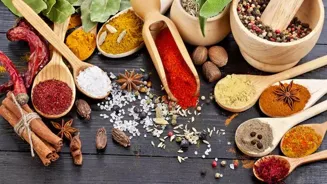Indian cuisine is renowned for its rich tapestry of spices, each adding distinct flavor, color, and aroma to the dishes. However, these spices are more
than just flavor enhancers; they play a crucial role in health and wellness. Ancient Indian culinary practices, rooted in Ayurvedic principles, utilize spices not only for taste but also for their medicinal and therapeutic properties. Modern science is now beginning to validate these age-old practices, revealing the incredible health benefits of spices in India’s diverse cuisine. This article delves into the science behind India’s spice-powered dishes, exploring how spices contribute to flavor, health, and vitality.
The Role of Spices in Digestion and Detoxification
Indian cooking often begins with the tempering of spices—such as mustard seeds, cumin, and curry leaves—in hot oil. This technique, known as "tadka" or "chaunk," not only enhances the aroma but also maximizes the medicinal qualities of the spices. Spices like cumin, coriander, fennel, and ginger are known for their digestive benefits. They help stimulate the production of digestive enzymes, reduce bloating, and promote healthy gut function.
For instance, cumin aids in digestion by improving the production of bile in the liver, which is essential for fat digestion. Fennel seeds, often consumed after meals, act as a natural carminative, preventing gas formation and aiding in smooth digestion. Similarly, ginger has been used for centuries to treat nausea, indigestion, and motion sickness, thanks to its ability to increase gastric motility and soothe the digestive tract.
Spices also help in detoxifying the body by improving circulation and promoting the elimination of toxins. Turmeric, with its active compound curcumin, is especially effective in reducing inflammation and acting as a powerful detoxifier. Curcumin has been widely studied for its ability to neutralize free radicals and reduce oxidative stress, offering protection against various chronic diseases.
Anti-Inflammatory and Antioxidant Properties
Many Indian spices are known for their potent anti-inflammatory and antioxidant properties. These properties are essential in protecting the body against chronic diseases such as heart disease, diabetes, and cancer. The science behind these effects lies in the bioactive compounds present in the spices, which have the ability to reduce inflammation and oxidative damage.
Turmeric, for instance, contains curcumin, a compound with strong anti-inflammatory and antioxidant effects. Curcumin works by inhibiting pro-inflammatory molecules in the body, reducing inflammation, and helping to manage conditions such as arthritis and autoimmune diseases. Similarly, cloves and cinnamon are rich in eugenol and cinnamaldehyde, compounds that act as natural anti-inflammatory agents and antioxidants, protecting the body from cellular damage caused by free radicals.
The use of these spices in everyday Indian dishes, such as dal (lentils), curries, and soups, not only enhances the taste but also provides a natural defense against inflammation, making Indian cuisine a powerful tool for promoting long-term health.
Spices for Metabolism and Weight Management
Indian spices are not only used for flavor but also play a significant role in boosting metabolism and promoting weight loss. Many spices, such as chili peppers, black pepper, and fenugreek, have thermogenic properties, meaning they can increase the body's core temperature and stimulate metabolism.
Capsaicin, the active compound found in chili peppers, has been shown to increase calorie burning by raising the body’s metabolic rate. It also helps reduce appetite, leading to a decrease in overall food intake. Similarly, black pepper, known for its pungent heat, contains piperine, which enhances the bioavailability of nutrients and increases fat metabolism. Fenugreek seeds, often used in Indian cooking, are high in soluble fiber, which can help regulate blood sugar levels and prevent fat accumulation.
These metabolism-boosting spices are frequently used in Indian curries, stews, and vegetable dishes, creating meals that not only satisfy the taste buds but also promote healthy weight management and metabolic function.

Spices in Immune System Support
Spices in Indian cuisine play a pivotal role in supporting the immune system, making the body more resilient to infections and diseases. Many Indian spices contain compounds that have antibacterial, antiviral, and antifungal properties, helping to protect the body from harmful pathogens.
Garlic, a staple in Indian kitchens, is well-known for its immune-boosting properties. Allicin, the active compound in garlic, has been shown to enhance immune cell function and inhibit the growth of harmful microorganisms. Similarly, ginger, known for its warming qualities, contains bioactive compounds that boost the immune system, reduce symptoms of colds, and aid in respiratory health. Tulsi (holy basil), another common herb in Indian cooking, is revered in Ayurveda for its powerful antimicrobial and immune-enhancing properties.
The regular incorporation of these spices into Indian dishes, such as curries, soups, and teas, provides a natural and flavorful way to strengthen the immune system.
The Therapeutic Effects of Spices on Mental Health
Spices in Indian cuisine also have a profound impact on mental well-being. The mind-body connection, deeply rooted in Ayurveda, views the state of the gut as a key determinant of mental health. Many spices found in Indian kitchens are known to alleviate stress, improve mood, and enhance cognitive function.
Ashwagandha, an adaptogenic herb commonly used in Indian medicine, helps the body manage stress and anxiety by regulating the production of cortisol, the stress hormone. Similarly, saffron, often used in desserts and savory dishes alike, has been shown to elevate mood and reduce symptoms of depression. Studies have indicated that saffron contains compounds that increase serotonin levels in the brain, promoting a sense of well-being.
Furthermore, the calming effects of chamomile and cardamom, used in traditional Indian teas, can reduce anxiety and promote restful sleep, contributing to overall mental health.
The Cultural and Culinary Legacy of Spices
Indian cuisine's use of spices is more than just culinary; it is deeply embedded in cultural traditions and holistic wellness practices. The principles of Ayurveda have long championed the healing powers of spices, viewing food as medicine that nourishes both the body and the mind. Today, as scientific research continues to uncover the health benefits of spices, India’s spice-powered cuisine is gaining global recognition not only for its complex flavors but also for its ability to promote long-term health and vitality.
The science behind India’s use of spices offers insight into how food can be a powerful tool for health, emphasizing the importance of flavor, balance, and nourishment in every meal. With their therapeutic properties, Indian spices continue to contribute to both the culinary and wellness worlds, enhancing health one flavorful dish at a time.





















